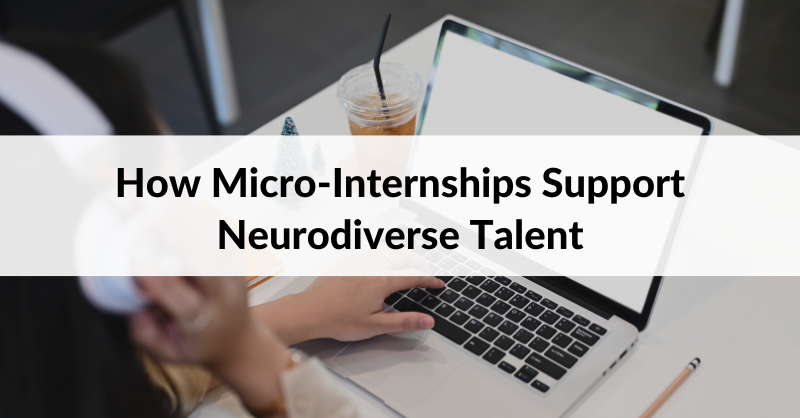
How Micro-Internships Support Neurodiverse Talent
It has been shown time and again that when people with different backgrounds, experiences, and perspectives work together, workplaces benefit. Companies with diverse hiring practices are 35% more likely to have a healthy bottom line than comparable companies that lack diversity, and companies that lack diversity, equity, and inclusion policies risk losing up to 76 percent of their existing talent. However, one area of diversity that doesn’t consistently receive as much attention, perhaps because of its often invisible nature, is neurodiversity.
What is Neurodiversity?Neurodiversity commonly refers to people on the autism spectrum or those diagnosed with dyslexia, dyspraxia, or other learning disabilities. While there are difficulties associated with these diagnoses, the term neurodiversity is intended to recognize and respect the differences associated with these conditions, as opposed to the deficits. In short, neurodiverse people - who make up an estimated 15-20% of the global population -experience and operate in the world differently than neurotypical people.
Benefits of Neurodiversity in the Workplace
Just as other forms of diversity benefit the workplace, neurodiversity is a competitive advantage. It offers new perspectives, ideas, and methods of working that don’t naturally occur to neurotypical people. WebMD clarifies just one example of how neurodiverse people bring unique talents to their professional lives, acknowledging that “people with ADHD may have trouble with time management. But they often show high levels of passion, drive, and creative thinking.”
Neurodivergent individuals can excel in a wide range of industries, including those that require in-depth technical skills and a great deal of creativity. For example, Steve Jobs, Jerry Seinfeld, and Tim Burton, all celebrated leaders in their fields (technology, comedy, and film, respectively) are also neurodiverse.
In fact, studies have shown that those on the autism spectrum demonstrate outstanding attention to detail, professionals with dyslexia are adept at identifying trends, and ADHD employees display exceptional levels of creativity, as well as heightened abilities to work well under pressure, as reported by Forbes.
Why Employers are Missing out on this Important Demographic
There are a variety of reasons why employers are unintentionally filtering these highly qualified, high-contributing candidates out of their hiring pools, especially when it comes to early career talent.
A WebMD article quotes Sarah Cussler, assistant director of Undergraduate Writing and Academic Strategies at Yale Poorvu Center for Teaching and Learning, who explained, "Neurodiverse students are wonderful students. They can be really creative, big-picture, out-of-the-box thinkers. But with some classic kinds of assessments, they have more difficulty." For example, individuals with ADHD, despite often being highly intelligent, are more likely to struggle academically. Consequently, when employers consider GPA in their hiring decisions, as 43.5% still do, they may be mistakenly filtering out neurodiverse talent.
The interview process is another distinctive hurdle for members of the neurodiverse community. Many of the diagnoses that result in the benefits identified above can also be accompanied by communication struggles, particularly in unfamiliar or distracting environments with new people-often the setting for an interview. Even nonverbal communication, such as eye contact, can be disproportionately challenging for neurodiverse candidates. Accordingly, weighing these elements heavily in a recruitment process can leave these talented individuals at a disadvantage.
How Micro-Internships can Help
Parker Dewey Micro-Internships are short-term (typically 10-40 hours), paid, professional projects that allow candidates to explore roles, interact with existing employees, and build their resumes through short-term opportunities. The vast majority of Micro-Internships are also remote, allowing talent to engage in these experiences from the comfort and familiarity of their own home. This alternative to traditional hiring helps recruiters access the neurodiverse talent pool in various ways.
-
Easy for Candidates: ADHD candidates, in particular, may have a passion for the work your company does, but not for an arduous application and interview process. Keeping the application simple and only requiring responses to a few short-answer questions, makes you more likely to engage candidates who might not have otherwise taken the time to apply with your company.
-
Easy for You: When you review applications, it’s easy for you to review candidates’ short answer responses and determine if their passions and skills align with your organization. While traditional information like major and GPA are still available, we purposely don’t have filters, meaning you won’t accidentally bypass neurodiverse candidates based on those criteria.
-
Remote Work: New environments can be overwhelming or overly stimulating for neurodivergent individuals. Due to most Micro-Internships being completed remotely, candidates can apply for and engage in opportunities from a familiar environment. This allows the talent to be assessed on the skills that are relevant to the position as opposed to their interviewing abilities.
-
A Proven Track Record: 80% of students selected for Parker Dewey projects come from underrepresented populations in the workforce. Using Micro-Internships as a recruiting tool can help you reap the rewards of a diverse team.
In short, Micro-Internships give Career Launchers an opportunity to show what they're capable of by making it easy for them to engage in an accessible hiring process from an environment where they are more likely to be successful.
Have an opening for early career talent? Use Micro-Internships to audition students and recent graduates (including those who are neurodiverse) in an accessible way.



.png)
